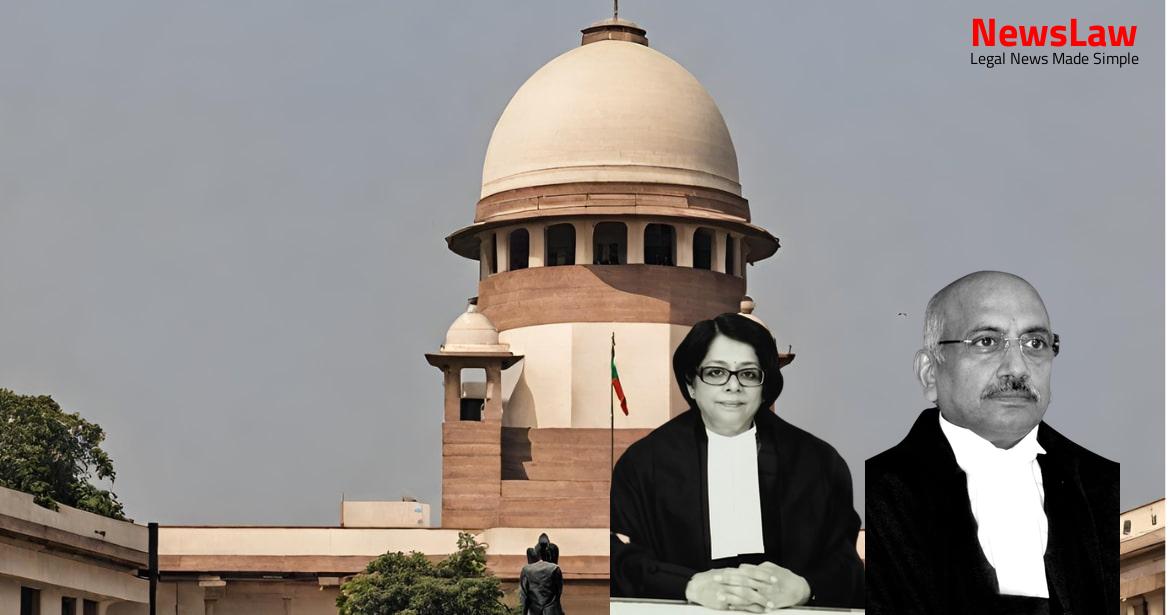The court’s legal analysis in this case delves deep into the interpretation of reservation benefits for SC/ST/OBC in Jharkhand. With a focus on constitutional mandates and the Act 2000, the court’s decision sheds light on the complexities surrounding migration, caste origins, and entitlement to reservation benefits. Let’s explore the nuances of this case and its implications on reservation rights and legal provisions.
Facts
- The interpretation of Section 50(5) of the Wildlife Protection Act, 1972 was discussed in detail.
- The concept of Wildlife Sanctuary and its purpose was explored.
- The differences between Section 27 and Section 29 of the said Act were examined.
- The importance of conservation of wildlife and its habitats was emphasized.
- Appellant was appointed as Assistant Teacher in Jharkhand in 1999 in the SC category.
- He participated in a civil services exam in 2008 as an SC candidate and ranked 5th for 17 SC vacancies.
- His appointment was withheld, and lower-ranked SC candidates were appointed instead.
- State authorities claimed he was a permanent resident of Bihar, not eligible for SC category in Jharkhand.
- High Court ruled in favor of the appellant for appointment, but State appealed and won in a 2:1 decision.
- Other appeals involve constables from Jharkhand terminated for being residents of Bihar and not entitled to SC/ST/OBC benefits.
- One appellant’s father was from Bihar, but the appellant was born and raised in Jharkhand post-reorganisation.
- Appellants’ appeals against termination were dismissed by the High Court in 2015.
Also Read: Electoral Malpractices in Mayor Election
Issue
- Question of whether a person migrating from one State to another, due to involuntary circumstances, should be considered a migrant and deprived of privileges and benefits under the Presidential Order 1950.
- Consideration for providing facilities or protection for continuation of study or admission to migrants without prejudicing the rights of Scheduled Castes or Scheduled Tribes in the migrated State.
- Suggestion for legislatures or Parliament to consider appropriate legislations to ensure proper effect is given to the rights of Scheduled Castes and Scheduled Tribes under Articles 341 and 342 of the Constitution.
- Discussion on the fate of Scheduled Caste and Scheduled Tribe students moving to other States due to voluntary or involuntary transfer, and the need for protective treatment to enable them to continue their education.
Also Read: Balancing Power and Transparency: Electoral Bonds Struck Down, Disclosure Mandated
Arguments
- The appellants in the case are SC/ST/OBC members from the unified State of Bihar.
- After the creation of the State of Jharkhand, their caste/tribe/OBC identities are acknowledged in both Bihar and Jharkhand.
- The rights of the appellants to claim reservation in Bihar were limited by an amendment in 2003 to the Bihar Reservation of Vacancies Act.
- The minority view based on constitutional mandates and the Act 2000 supports the appellants’ claims for reservation benefits in Jharkhand.
- The Ministry of Home Affairs issued a Government Order stating reserved category benefits can only be claimed in one’s home state.
- Articles 341(1) and 342(1) of the Constitution mandate that reserved category benefits are limited to the state of notification by the President.
- The High Court’s view of considering the appellants as migrants to Jharkhand is deemed in violation of constitutional provisions and the Act 2000.
- It is argued that the place of origin of the appellants’ lineal descendants and their relocation should not disentitle them from claiming reservation benefits in Jharkhand where they are ordinary residents now.
- Learned counsel for the State of Jharkhand supports the majority view of the impugned judgment.
- The appellants are neither the original inhabitants nor permanent residents of the 18 districts forming part of the State of Jharkhand as per Section 3 of the Act 2000.
Also Read: Recall of Resolution Plan Approval: Legal Analysis
Analysis
- The Act 2000 ensures the protection of service conditions for employees appointed before the appointed date.
- Employees originally from territories now part of Jharkhand can continue in their posts in the successor State of Jharkhand if they opt to remain in Bihar.
- Employees belonging to SC/ST/OBC are entitled to claim reservation benefits in Bihar even if residing in Jharkhand before the appointed date.
- The Constitution empowers the President to specify Scheduled Castes and Scheduled Tribes based on social and economic backwardness.
- The caste, race, or tribe specified in the Presidential Order under Articles 341(1) and 342(1) are deemed to be SC/ST for the specific State or Union Territory.
- Various parameters are considered to recognize a caste/race as SC/ST in a specific State or Union Territory.
- The caste certificate is issued based on domicile and entitlement to privileges and benefits throughout the State.
- The Act 2000 provides protection for employees’ service conditions and reservation benefits post reorganization of States.
- Specific Government Orders clarify the entitlement to benefits for migrants from one State to another based on caste origin.
- Employees allocated to States based on domicile, option, and seniority are protected under the Act.
- The allocation of posts between successor States is based on specific criteria to ensure fair distribution.
- Exceptional cases are catered for in the guidelines to allocate employees to their preferred States.
- Employees have the right to claim reservation benefits in one successor State without simultaneous claims in both States.
- Scheduled Castes and Scheduled Tribes in some States faced social disadvantages and lack of facilities for development, leading to the need for reservations and protection.
- Benefits of reservation provided by the Constitution are confined to the geographical territories for which Scheduled Castes/Scheduled Tribes have been notified.
- Involuntary migration of Scheduled Castes/Scheduled Tribes from one State to another was discussed, leaving the matter for the legislature or Parliament for appropriate legislation to protect their rights and privileges.
- Members of Scheduled Castes in one State cannot claim the same status in another State, and migrants are not entitled to reservation benefits in the States/Union Territories they have migrated to.
- The interest and well-being of Scheduled Castes and Scheduled Tribes as a whole in the country should be considered when determining the status of migrants in another State.
- A person belonging to a Scheduled Caste in one State cannot be considered as a Scheduled Caste in relation to any other State to which he migrates for employment or education.
- Conditions of service of persons serving in connection with the affairs of the Union or any State remain governed by Chapter I of Part XIV of the Constitution.
- Conditions of service for persons allocated to the States of Bihar or Jharkhand under Section 72 cannot be changed to their disadvantage without prior approval from the Central Government.
- Services rendered before the appointed day by a person allocated to a State shall be deemed to have been in connection with the affairs of that State.
- Services rendered before the appointed day by a person allocated to the Union in connection with the administration of Jharkhand shall be considered as rendered in connection with the affairs of the Union for the purpose of regulating conditions of service.
- Persons holding posts or offices in connection with the affairs of the existing State of Bihar, within areas now falling under successor States, shall continue to hold the same post or office in the successor State. They will be deemed to have been duly appointed by the government or appropriate authority of the successor State.
- Competent authorities can pass orders affecting the continuance in a post or office of such persons from the appointed day onwards.
- The appellants submitted their applications in response to an advertisement by the State of Jharkhand for the post of Constable in 2004.
- The appellants did not misrepresent any information during the selection process.
- The appellants belong to castes/tribes/OBCs that are recognized in the Constitution and State notifications.
- The appellants served in the selected posts for 3-4 years before their services were terminated in 2008.
- Despite losing almost 13 years in litigation, the appellants were not at fault in the situation.
- Considering the peculiar facts and circumstances, the appellants are entitled to reinstatement in service with notional fixation of pay and allowances.
Decision
- The appellant Pankaj Kumar shall be appointed based on his selection in reference to advertisement no. 11 of 2007
- He is entitled to seniority as per his placement in the order of merit with notional fixation of pay & allowances
- In Civil Appeals @ SLP(Civil) Nos. 3610-3615 of 2021, the termination orders are quashed and the appellants shall be reinstated with notional pay & allowances
- No arrears of salary will be provided up to the date of appointment/reinstatement
- Compliance with the decisions is required within six weeks
Case Title: PANKAJ KUMAR Vs. THE STATE OF JHARKHAND (2021 INSC 414)
Case Number: C.A. No.-004864-004864 / 2021



